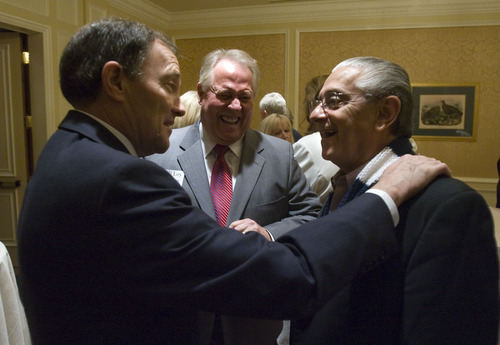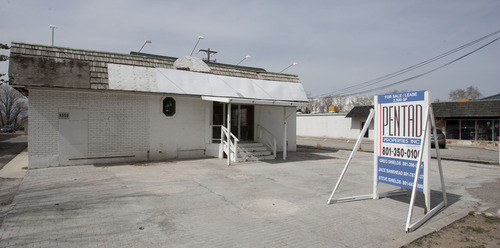This is an archived article that was published on sltrib.com in 2013, and information in the article may be outdated. It is provided only for personal research purposes and may not be reprinted.
Gulp.
Dell Loy Hansen admitted to swallowing hard upon seeing one sizable line item in Real Salt Lake's books, which he scrutinized in detail before buying full ownership of the team in January.
That entry obligated him to contribute $7.5 million to a soccer-oriented regional athletic complex that Salt Lake City is close to building at 1900 W. 2200 North.
"I wished it hadn't existed," he said of the pledge, made by former Real Salt Lake owner Dave Checketts to secure public funding for the team's $110 million stadium in Sandy. But it did, and as far as Hansen was concerned, a deal is a deal.
So he sat down with Salt Lake City Mayor Ralph Becker and confirmed he would fulfill the pledge when the city is ready to proceed on the soccer complex, whose development was held up for years by recently dismissed lawsuits.
Hansen also reiterated his commitment to create a soccer academy where Utah's top teenage players could hone their skills and advance to higher levels of play, perhaps up to Real Salt Lake itself.
In a small market such as Salt Lake City, developing home-grown talent is a financially responsible way to challenge the deep pockets of teams in New York and Los Angeles, Hansen figured. He viewed building the academy and up to 15 soccer fields as a means of accomplishing that goal.
"We were totally on the same page," Hansen said of his meeting with Becker. "It felt like a kumbaya moment."
City officials were ecstatic that Hansen, a prominent downtown landowner, was fully behind the soccer project.
"We knew Mr. Hansen from his long engagement in the city, his development projects and community leadership," said Becker's spokesman, Art Raymond. "We expect that same leadership to move RSL forward in exciting ways. There are great opportunities for the city and RSL to participate in activities at the new complex."
This spring, the city plans to issue $15.3 million in bonds to begin construction of the complex, including one field with lights and seating for a couple of thousand spectators.
Approved by voters in 2003, the bond issuance was held up for years by litigation filed by a group called the Jordan River Restoration Project. But in mid-December, the Utah Supreme Court rejected the group's lawsuit, clearing the way for the project to proceed.
Six weeks later, Hansen bought out Checketts and quickly put to rest any fears city officials might have had about RSL backing out.
The lawsuits, in fact, put Hansen in a better position to fulfill his obligation, he said. They delayed the city's need for RSL's money long enough for Hansen to renegotiate the mortgage on Rio Tinto Stadium, freeing up cash for the complex and the academy.
That was welcome news to Marco de Ruiter, technical director of Sparta United Soccer Club and a coach of boys ages 15 through 18 — the players targeted by Real.
"We have some very good players in Utah," he said. "The biggest benefit [of the academy] is that the best players from different clubs in the state will play together and they will have to improve to go to the next level.
"I'm very happy with the soccer complex, too. It will make soccer better in Utah," de Ruiter added, contending the lighted championship field will help Utah attract large regional tournaments and their economic impact.
Now that the mortgage adjustment on the stadium has stabilized Real Salt Lake's financial situation, the real-estate developer in Hansen also is eager to begin upgrading the land around Rio Tinto Stadium.
Sandy city officials had big hopes for turning that hodgepodge of nondescript buildings and vacant lots into an economic-development plum. But just as the stadium opened in October 2008, the financial system (including Checketts' financial partner, Lehman Brothers) crashed. The Great Recession brought urban renewal to a halt.
Almost five years later, Hansen and city officials have high hopes again.
"We've had some dialogue with Dell Loy. He's a developer by trade, so this is right up his alley. He has some great ideas," said Nick Duerksen, Sandy's director of business and economic development.
"We've never given up on the vision of what can happen," he added. "Last year we reinvigorated discussion about the land around the stadium. Real has been front and center in those discussions."
That's right, Hansen said, citing a desire to expand team facilities for an interactive fan zone, add more parking and retail space, and maybe even build a four-star hotel.
"We've done some sketches," he said, "but we had to fix the [financial] drain in the [team] bathtub first."
Twitter: @sltribmikeg —
Founded Wasatch Property Management Inc. in 1988 in Logan.
• Wasatch currently manages 76 residential communities with approximately 18,000 apartment units. It owns more than 20 commercial buildings with 3.2 million square feet of rental space throughout the West, a real-estate portfolio worth more than $1.2 billion.
• Downtown Salt Lake City properties include the Wells Fargo Tower, Ken Garff Building and the Chase Building.
• Owns The Woodlands commercial development, 3855 S. 700 East, along with 14 venture companies in Utah, Idaho and California. They include a recycling and waste disposal company in Sacramento, a plastic injection and molding company, a golf course, a wood milling firm, and one of the country's largest utility management and billing companies.
• Built a Sports Academy to foster youth athletics in North Logan in 1998.
• Purchased 49 percent share in Real Salt Lake in October 2009. Made it 100 percent in January 2013, also acquiring Rio Tinto Stadium and radio station ESPN 700.
• Developed Riverwoods business park in Logan, which includes a Marriott Suites hotel, a convention center, a restaurant and Wasatch Property Management corporate offices.
• Donated more than $10 million to charitable organizations. The Hansen Charitable Support Foundation provides scholarships for 20 to 25 students a year to attend Utah State University, and also supports 100 tuition scholarships for students in USU's Jon M. Huntsman School of Business.











